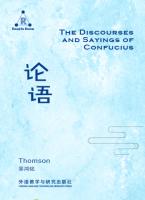Review of The Discourses and Sayings of Confucius
谢葳
The first thing I need to remember when thinking about Confucius is the
context that he lived in. It’s easy to blame him for an East Asian
culture where originality and disagreement have been so taboo for so
long. In the Warring States era, a feudal society with a high turnover
rate of kings and lords, it’s not surprising that harmony was valued
(perhaps overvalued) because it was so rare. Maybe one of the most
important myths to debunk about Confucianism is that loyalty does not
equal submissiveness. Confucius emphasizes loyalty, and teaches
disciples to advise kings to do what is right and to correct them when
they are wrong, and he himself stood up to many monarchs in his time. To
him, loyalty is to stand by your king and advise him and protect him. It
doesn’t mean to obey orders when those orders are immoral. If the
foolish king refuses to listen, then it’s time to bounce. Another
notable concept absent from The Sayings is the concept of punishment.
When we today learn about the cruel traditional punishments inflicted by
Chinese regimes, or the perverse measures that civil service scholars
went to in the name of studiousness, little do we realize Confucius
would cringe at such extremities. This punitive culture developed as a
result of Legalism, which enforced harsh discipline and helped the state
of Qin ascend to empire a couple hundred years after Confucius died. I
am in favor of the note that we can’t rate The discourses and sayings of
Confucius but we can rate the edition that we have used and read. And
this one translated by Ku Hung-Ming can be defined as a classic one,
though it still has some downsides. But I highly recommend this edition
to my non Chinese friends to read.



 京公网安备 11010802032529号
京公网安备 11010802032529号